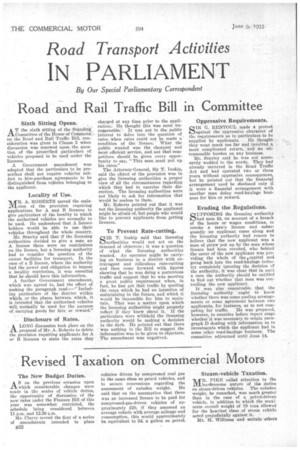Road Transport Activities
Page 36

If you've noticed an error in this article please click here to report it so we can fix it.
IN PARLIAMENT
By Our Special Parliamentary Correspondent
Road and Rail Traffic Bill in Committee
Sixth Sitting Opens. , AT the sixth sitting of the Standing Committee of the House of Common's, on the Road and Rail Traffic Bill, consideration was given to Clause 5 when discussion was renewed upon the question of the prescribed particulars of vehicles proposed to be used under the licences.
A Government amendment was adopted that the particulars to be prescribed shall not require vehicles subject to hire-purchase agreements to be distinguished from vehicles belonging to the applicant.
Locality of Use.
iuy-R. A. ROBERTS moved the omisIV_Lsion of the provision requiring applications for A and B licences to give particulars of the locality in which the authorized vehicles are normally to be used. He understood that A licence holders would be able to use their vehicles throughout the whole country. Mr. Stanley said that if the licensing authorities decided to give a man an A licence there were no restrictions on the licence, but a licensing authority had to consider the question of the excess facilities for transport. In the ease of a B licence, where the authority had the power and obligation to impose a locality restriction, it was essential that he should have this information.
A further Government amendment, which was agreed to, had the effect of making the paragraph read :—" Including particulars of the district within which, or the places between which, it is intended that the authorized vehicles will, normally be used for the purpose of carrying goods for hire or reward."
Disclosure of Rates.
ALONG discussion took place on the Proposal of Mr. A. Roberts to delete the provision requiring applicants for A or B licences to state the rates they charged at any time prior to the application. He thought this was most unreasonable. It was not in the public interest to delve into the question of rates when rates could not be made a condition of the licence. What the public wanted was the cheapest and most efficient service, and not thaf competitors should be given every opportunity to say, " This man must put up his rates."
The Attorney-General, Sir T. Iuskip, said the object of the provision was to give the licensing authorities a proper view of all the circumstances regarding which they had to exercise their discretion. The licensing authorities were not likely to ask for information that would be useless to them.
Mr. Roberts pointed out that it was not the licensing authority the applicant might be afraid of, but people who would like to prevent applicants from getting licences.
To Prevent Rate-cutting.
SIR T. Inskip said that licensing authorities would not act on the demand of objectors ; it was a question of what the licensing authorities wanted. An operator might be milling on business in a district with extravagant and ridiculous rate-cutting and then come forward with figures showing that he was doing a portentous traffic and suggest that he was meeting a great public requirement when, in fact, he had got that traffic by quoting the rates which he had no intention of maintaining in the future, and which it would be impossible for him to maintain. That was a matter upon which the licensing authorities might properly reflect if they knew about it. If the particulars were withheld the licensing authority would be making a decision in the dark. IIe pointed out that there was nothing in the Bill to suggest the information was to be given to objectors. The amendment was negatived. Oppressive Requirements.
SIR G. RI-INTO-CI made a protest against the oppressive character of the requirements as to particulars to be
supplied by applicants. He thought they went much too far and involved a most complicated return, and an unreasonable burden on any business.
Mr. Stanley said he was not necessarily wedded to the words. They had already occurred in the Road Traffic Act and had operated two or three years without oppressive consequences, but he pointed out that the financial arrangement need be disclosed only if it were a financial arrangement with another man doing road-haulage business for hire or reward.
Evading the Regulations.
SUPPOSING the licensing authority had seen fit, on account of a breach of the hours or wages conditions, to revoke a man's licence and subsequently an applicant came along and the licensing authority had reason to believe that the new applicant was a man of straw put up by the man whose licence had been revoked, who behind the cover of the new applicant was providing the whole of the capital and going back into the road-haulage industry completely ignoring the decision of the authority, it was clear that in suc'a a case the authority should be entitled to find out whether that man was controlling the new applicant.
It was also conceivable that the licensing authority ought to know whether there was some pooling arrangements or some agreement between two applicants, for instance, as to not com peting for traffic. He was prepared, however, to consider before report stage whether it was necessary to retain paragraph D dealing with information as to investments which the applicant had in some other road-haulage business. The committee adjourned until June 14.




























































































